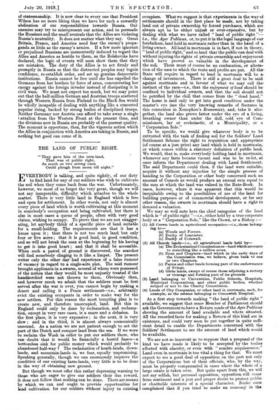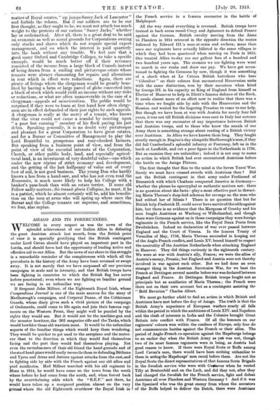THE LAND OF PUBLIC RIGHT.
" They gave him of the corn-land, That was of public right, As much as two strong oxen Could • plough from morn till night."
-E VERYBODY is talking, and quite rightly, of our duty to find. land. for any of our soldiers who wish to cultivate the soil when they come back from the war. Unfortunately, however, we most of us forget the very' great, though we will not say insuperable, difficulty which attaches to the whole matter. There is very little land in England which is free. and open for settlement. In other words, not only is almost every piece of land which is worth cultivating at this moment in somebody's occupation and being cultivated; but there is also in most' cases a' queue of people, often with very good claims, wishing to occupy. To prove that we are not exagger- ating, let anybody think of a specific piece of land suitable for a small-holding. The requirements are that it has a house upon it ; that there is not too much land but only four or five acres ; that it is good land, in good condition, and so will not break the man at the beginning by his having' to get it . into, good heart ; and that it shall be accessible. When such. a parcel of ground is discovered, the searcher will find somebody clinging to it • like a limpet. The present writer only the other day had experience of a false rumour of vacancy in regard to a single-acre plot. The said rumour brought applicants in a, swarm, several. of• whom were possessed of the notion that they would be most unjustly treated if the handkerchief were not thrown to them. Obviously then, and however much we admit that the soldiers must be first served after the war is over, you cannot begin by making a desert and calling it a Peace settlement,i.e., arbitrarily evict the existing occupants in order to make way for the new settlers. For this reason the most tempting plan is to create new, and therefore unoccupied, land. But this in England could only be done by reclamation, and reclama- tion, except in' very rare cases, is a snare and a delusion: In the first place,• it is very•expensive ; in' the' next, it is very slow ; and in the third, it is almost always economically unsound. As a nation we are not patient enough to act the part of, the 'Dutch and conquer land from the sea. If we were to reclaim the Wash in order to put our soldiers there, who can doubt that it would be financially a horrid fiasco--a bottomless sink for public money which would probably be abandoned halfway ? The reclamation of heath-lands, down- lands, and mountain-lands is, we fear, equally unpromising. Speaking generally, though we can enormously improve the condition of our existing farm-lands, very little is to be done in the way of obtaining new ground.
But though we must oiler this rather depressing warning to those who are eager to give our soldiers their duo reward, it does not follow that nothing can be done. There are means by which we can and ought to provide opportunities for land cultivation for our soldiers without injury to existing: occupiers. What we suggest is that experiments in the' way of settlements should in the first place be made, not by taking: land out of private ownership by forced purchases, which are always apt to be either unjust or over-expensive, but by dealing with what we have called " land of public right "— i.e., the Ager Publicus, or, to put it in the legal language of our forefathers, land held in mortmain rather than in the hand of a, living owner. All land in mortmain is in fact, if not in theory, " land of public right," and so land that the public can deal with. without injuring the rights of private ownership and enjoyment' which have proved so valuable in the development of the soiL There must of course be no confiscation, or alters., tion of the uses to which the rents and profits are put All the. state will require in regard to land in mortmain will be' a. change of investment. There is still a great deal to be said against mortmain and in favour of what we may call they instinct of the race—i.e., that the enjoyment of land should be confined to individual owners, and that the soil should not be petrified by the chill that comes from the " dead hand." The horse is said only to get into good condition under the master's eye (see the very knowing remarks of Socrates in this connexion in Xenophon's .Economics), and, take it alto; gether, the land also grows fatter under the eye of a living, breathing owner than under the dull, cold. eye of Com- missioners, lay or ecclesiastic, of a Municipality, or a " Corporation Sole."
To be specific, we would give whatever body is to be entrusted with the task of finding soil for the Soldiers' Land Settlement Scheme the right to requisition and appropriate (of course at a just price) any land which is held in mortmain, or which comes within a statutory definition of public) land. We would, that is, make everybody holding land in mortmain, whenever any farm became vacant and was to be re-let, at once inform the Department dealing with Land Settlement. The said Department could then, if the land were suitable; acquire it without any injustice by the simple process of handing to the Corporation or other body concerned such an amount of Consols as would produce an annual sum equal to the sum at which' the land was valued in the Rate-Book. In cases, however, where it was apparent that this would be inequitable owing to the possibilities of use of the, land for building' purposes or of commercial development, or for any other reason,. the owners in mortmain should have a right to demand a valuation.
We may as well note here the chief categories of the land which is " of public right "—i.e., either held by a true corporate body or a " Corporation Sole," like-the Crown, or a Bishop :— (II All Crown lands in agricultural occupation—i.e., those belong.
ing to-
4 Woods and Forests. lcrcfLlctaier
. c) Duch of Cornwall.
(2) All Church lands--i.c. all agricultural lands held by— • (a) The Feelesiasacal Commissioners—land whir& amounts to something like a million acres.
(b) Dean and Chapters—land which in the early days of the Commission was, we believe, given back to ono• or two Chapters.
(c) Farms and other lands forming part of the endowments of livings.
((I.} Glebe lands, except of course those, adjoining a rectory or vicarage and forming part of its grounds.
(3) T..nnd belonging to Universities, Publie Schools, Hospitals, Municipal Corporations, and other public bodies, whether subject or not to the Charity Commission.
(4) Lands of City Companies, or other land in mortmain, such, for example, as the estates belonging to Greenwich_ Hospital.
As a first step towards making " the land of public right " available; we suggest that some Member of Parliament should ask the Government to have a Return made of the Ager Publicus.' showing the amount of land available and where situated. All the recorded facts for making a Return of this kind, are in existence, and could very soon be put together in quite suffi- cient detail to enable the Departments concerned with the' Soldiers' Settlement to see the amount of land which would be available.
We are not so innocent as to suppose that a proposal of the kind we have made is likely to be accepted by the bodies affected with alacrity, or even with " sombre acquiescence." Land even in mortmain is too vital a thing for that. We must expect to see a good deal of opposition on the part not only of the Corporations but of their officials, who, by the way, must be properly compensated in cases where the whole of a large estate is taken over. But quite apart from this? we will not say selfish, but personal opposition, opposition will come from sentiment and a just and proper desire to' protect public or charitable interests of a special character. Burke once complained that if you tried to make all economy in the matter of Royal estates, " up jumps Saucy Jack of Lancaster " and forbids the reform. But if our soldiers are to be our first thought, as they ought to be, we must not attach too much weight to the protests of our various "Saucy Jacks," whether lay or ecclesiastical. After all, there is a great deal to be said on economic as well as moral grounds for Corporations owning only stocks and shares which do not require special expert management, and on which the interest is paid quarterly into the bank without any trouble. We feel sure that a good many Oxford and Cambridge Colleges, to take a specific example, would be much better off if their revenues consisted of the income from a large block of Consols instead of being drawn from a smiling and picturesque estate whose tenants were always clamouring for repairs and alterations in rent which in effect were reductions. Again, there are plenty of livings where the clergyman would be greatly bene- fited by having a farm or large parcel of glebe converted into a block of stock which would yield an income without any risks or reductions, or what are often unanswerable in the case of a clergyman—appeals ad misericordiam. The public would be surprised if they were to learn at first hand how often clergy- men are in effect defrauded of their just rights by such appeals. A clergyman is really at the mercy of a tenant, who knows that the vicar could not cause a scandal by insisting upon " a poor but cunning " member of his flock paying his just debts. Speaking generally, it is no doubt very picturesque and pleasant for a great Corporation to have great estates, and for a Bursar or Committee of Management to play the Lord Bountiful to prosperous and rosy-cheeked farmers. But speaking from a business point of view, and from the point of view of the essential interests of the Corporation, Church, or other public body, land, and especially agricul- tural land, is an investment of very doubtful value—one which under the new regime of strict economy and development, and the getting of the last halfpenny of value out of every foot of soil, is not good business. The young Don who hardly knows a hoe from a hand-saw, and who has not even read the Economics, is much more likely to help his College with a banker's pass-book than with an estate terrier. If some old Fellow sadly mutters : Sic transit gloria Collegiae, he must, if he is a patriot, which he almost certainly will be, add his benedic- tion on the men at arms who will spring up where once the Bursar and the College tenants sat supreme, and sometimes, we fear, also-supine.



























 Previous page
Previous page